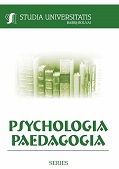MULTI- AND INTERCULTURAL EDUCATION- DIMENSIONS OF CONTEMPORARY EDUCATION
MULTI- AND INTERCULTURAL EDUCATION- DIMENSIONS OF CONTEMPORARY EDUCATION
Author(s): Niculae Cristea, Andreia Nicoleta MaximSubject(s): Psychology
Published by: Studia Universitatis Babes-Bolyai
Keywords: interculturality; multiculturality; intercultural – education; culture and identity; plurality – universality.
Summary/Abstract: Due to today’s tendencies towards globalisation, mondialisation and internationalisation, the educational system is faced with a great number of challenges. Multicultural and intercultural education represent dimensions of contemporary education which are largely moulded by the post-modernist and constructivist approach to education, the former being seen as a way to establish links between education itself and the formation of self-identity. Intercultural education can provide those individuals pertaining to a minority or a majority with the instruments they require to build their own vision of reality by offering them several models to acknowledge the world, filtered through the existing cultural representations in a multicultural environment. This enables communication between cultures which are largely based on the same essence and between which there are relations of interdependence and mutual influence, which in turn leads to an alteration in political culture. Our conclusion is that, despite certain apparent inadequacies between the postulates of the post-modern paradigm and some characteristics of psycho-pedagogic constructivism, intercultural education represents not only one of the major challenges of the contemporary educational systems, but also a possible solution for the prevention of major future national or international crises.
Journal: Studia Universitatis Babes-Bolyai - Psychologia-Paedagogia
- Issue Year: 58/2013
- Issue No: 2
- Page Range: 109-120
- Page Count: 12
- Language: English

